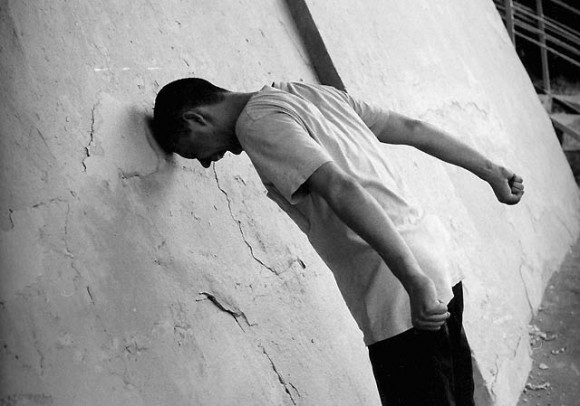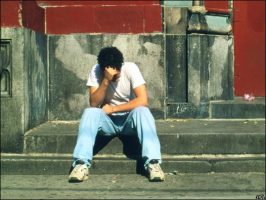The Russian edition of Esquire magazine recently published a letter written by a teenager relating his experience of undergoing forced treatment for his homosexuality. We present the text of this letter below, followed by comments offered by Archpriest Alexei Uminsky, Archpriest Alexander Iliashenko, Priest Dmitri Sverdlov, and Archpriest Andrei Lorgus.
Ivan Kharchenko, a sixteen-year-old student, writes:
The problems with my parents began when I was fourteen. They never liked my friends. Naturally, this didn’t please me: neither knowing my friends nor wanting under any circumstances to get to know them, my relatives spoke of them in a way that made my ears curl. There were scandals practically every evening. Sometimes there were breaks from the scandals, but they were, quite honestly, infrequent.
The storm began when I told my family about my homosexual orientation. By the time I was sixteen, I understood well that I liked the opposite sex less than my own. I successively told my mother, father, grandfather, and grandmother that I was gay. I didn’t want them to take me for another person, but to love me as I am.
I understood, of course, that their reaction would not be a happy one, but I had hoped that in time they would come to terms with it. I naively thought that the scenario would look something like this: an explosion, scandal, and then peace and quiet, with us going on living as before. Everything happened in exactly the opposite way: my family listened to me with glum faces without saying a word or crying, pretending that nothing was happening, that everything was just fine.
A few days later the shouting began: “How will you get married? Where will you get children? What will happen to our family line?” And so forth. When my family understood that I didn’t want to reply to these questions and that, being a peaceful person, I didn’t want to get involved in any further scandals, they changed their tactics.
In the beginning of April my grandmother said to me: “Today we’re going to a therapist for an examination. Get ready.” I agreed, inasmuch as I’d be able to miss school. I’m not a truant, but on that day there was an algebra test for which I hadn’t managed to study. So, in short, I dressed, got myself ready, and off we went. We arrived at the building, on the first floor of which was a sign reading “Mikhail Vinogradov’s Center for Legal and Psychological Help in Extreme Cases.”
I was conducted into a room where an ordinary looking man sat at a desk. But laid out on the desk in front of him were some fairly strange objects: a knife, a container with water, and a container with oil. The man asked me in a tragic voice: “Do you want to be delivered from your problems?” I replied that, yes, I have problems with my schoolwork from which I would gladly be delivered.
But the man said: “Now we are going to deliver you from the demon of homosexuality.” After that, he acted quite strangely: he began to run around me, waving a knife. He splashed water on me and belched at me in both ears. In all, this looked like some kind of pagan rite. After ten minutes I burst out laughing and left the room. They say that such séances cost around 50,000 rubles [$1,500].
I harbored no resentment against my grandmother. I’m a forgiving person: what happened, happened. Three days later my father came to me by car. He told me that he was taking me for a one-day examination in a clinic and that I’d be back home that same evening.
We drove for a long time. When we left the Kiev highway and turned onto Narofominsk, I assumed I was being taken to Dr. Marshak’s rehabilitation clinic. We have a dacha in Aprelevka, about a fifteen-minute drive from the clinic, and I had frequently gone by the clinic fence on my bicycle. I wasn’t scared, but it was all terribly unpleasant.
We left for the clinic in the morning, arriving in the afternoon. Once I had been brought in, they immediately began to ask me if I used drugs. Then they asked my father the same questions, to which he replied in the negative. I was then led out of the office while my father remained inside.
The nurse said: “Now we’ll take you to the ward.” To be honest, I didn’t quite understand where I was being led: if they thought I was a drug addict they would’ve searched me in the reception area and only then taken me to a room. But they didn’t search me: by my appearance alone it was evident that I wasn’t a drug user.
Later it emerged that my father had spoken about my homosexuality with the doctor and then left without saying goodbye to me. My father has a harsh personality. Even my mother is afraid of arguing with him, so you can imagine how I feel. I was left in the clinic. Only three days later did I learn that my father had arranged for me to be hospitalized for three weeks.
The rooms were single-occupancy and small: bed, table, chair, closet, and television. On the first floor was a barred window; on the second, where I was staying, there were no bars on the windows, but all the handles had been removed. All means of communication were forbidden apart from calling the phone numbers written on a chart.
I was permitted one call a day, for no longer than five minutes. I could go no further than the back part of the territory. There were guards around the perimeter as well as infrared sensors on posts.
I didn’t understand why I was being held under such conditions, and only after three days did one of the psychiatrists let slip that my father had placed me here to be cured of homosexuality and, moreover, that there had already been a case in which parents had placed their son in the clinic to be cured of his untraditional orientation.
I myself didn’t understand their methods of treating homosexuality: the nurses never told me what shots and pills they were giving me. Incidentally, since receiving this treatment I’ve begun to have problems with my memory, confusing what happened yesterday with what happened fifteen minutes ago.
On the first day they performed some sort of tests on me, the purpose of which I didn’t understand. Every morning they gave me pills – I don’t know what they were. They said there were “enzyme modulators,” but they made me extremely sleepy. I was in a constant foggy state.
Every day they carried out the following procedures: they placed me in some sort of module in which I was to lay still for thirty minutes to have my blood cleansed by an intravenous laser. Sensors were placed on my head that affected the areas of my brain responsible for addiction.
I was also forced to go to group meetings at which patients told about their relationship with drugs. I had nothing to say. Two days later I received permission to make a phone call (I was able, while being signed in, to memorize the telephone numbers on the chart for my mother and my friends.) First I called my friends to say that I needed to be rescued. Then I called my mother.
All in all, I spent ten days in the clinic. On the morning of April 25, reporters arrived at the clinic. The head doctor of the Marshak Clinic, Dmitri Vashkin, called for me. He said: “Call off the reporters.” I didn’t do anything, and began to return to my room. Then Vashkin called for me again and began to question whether I liked the clinic. I, of course, replied in the negative.
My friends and the journalists stood at the clinic gates. The guards didn’t allow them into the clinic, promised to call the brigade, and said: “this will be the last day of your lives.” In response, the journalists called the Narofominsk police department. From the second-story window I saw a terrible fuss and a large number of cars. Afterwards, the head doctor said I’d be taken home in a car belonging to the clinic. A guard and a policeman went in the car with me.
We exited the gates and my friends immediately blocked our car with theirs, demanding that a lawyer accompany us. My friends were afraid that I’d not be taken home, but rather thrown into the nearby woods. The fact is that about five years ago a group from Solntsevo was held up at the clinic, and no one knows to this day if the clinic was involved. We raced along the highway at speeds of up to 200 km [125 mph]. My friends and the journalists raced along behind us.
I was brought to my grandparents’ house. When I rang the doorbell, my grandfather asked: “Who’s there?” I replied: “Vanya.” Then I heard: “Ivan Kharchenko doesn’t live here anymore.” It was very hurtful.
Then I was taken to my mother, who took me in. The fact is that my parents live apart and I have, for the most part, a normal relationship with my mother. How I’ll deal with my father from now on, I don’t know.
Archpriest Alexei Uminsky, Chaplain of St. Vladimir’s Orthodox School in Moscow, comments:
The problem of homosexuality is not a new one; it has been around for many, many millennia. Such people used to come to Confession; it was within the purview of the priesthood to work with them. But, obviously, homosexuality was then viewed as unnatural and sinful behavior.
Today, with the active socialization of homosexuality, a new problem has arisen for priests. The problem needs to be re-conceptualized. New opportunities need to be found for speaking with people who do not regard themselves as sinners and who feel that their condition is perfectly appropriate.
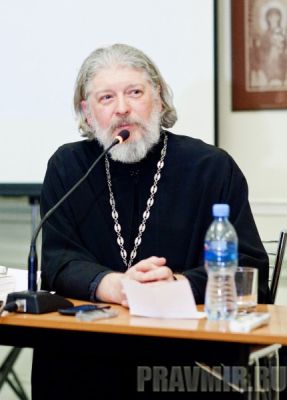 The question of how to resolve this problem today is quite a difficult one. Here we need to find new means of discussion and to find serious help from psychologists, psychotherapists, and priests who can understand this problem in its contemporary setting.
The question of how to resolve this problem today is quite a difficult one. Here we need to find new means of discussion and to find serious help from psychologists, psychotherapists, and priests who can understand this problem in its contemporary setting.
Obviously, those in question cannot but feel an inner dissonance regarding their choice; but, on the other hand, current public opinion is deceiving them, causing them to assert by all means that their way of life, behavior, and attitude to their inadequacy represent a special norm that should not only not be opposed, but that should in fact be supported by all means.
With regard to the contemporary attitude towards homosexuality, the question today is to understand how, while remaining within the firm and clear conviction that homosexuality is itself an abnormal sin, to have a discussion with people engaged in its socialization, people who are convinced of the opposite, and how to bring them to repentance.
Now, regarding the story described in the letter: clearly, when a fellow is placed in a mental hospital against his will, and with such methods of obvious force, this cannot be helpful. On the contrary, kids often go wild precisely out of hopelessness. What advice can be given to parents here? Before doing anything, they need to take some thought and consult a specialized psychologist who has some understanding of such problems.
Ten years ago I heard a story. I was staying with friends, far from the Church but very good people. I was introduced as a priest to everyone in their environment and many people wanted to ask advice of me in some way.
I spoke with one person, a fully formed man of at least fifty, fond of jokes not all of which were entirely decent. The subject of homosexuality also came up as an object of joking and mockery. His clearly regarded it as something abnormal, frequently employing the word “queer” in a wholly negative way, as a term of abuse.
It turns out that his son, a young man in his twenties, had told him that he was gay and had already been living with his boyfriend for several years. This was such a blow to the father that he nearly hung himself, so strong were his feelings. This was easily understandable. His son was the pride of the family: the boy had graduated from a Jewish religious school and was now developing a very successful career as a bank financier. And now he was living with his boyfriend.
This man said to me: “I don’t know what to do. I still regard the problem in the same way, but this is my son! I went to him to apologize for the way I had acted at first. Now we talk like friends, but there is nothing left for me to do but to love him.”
He did not know what prayer was or how to look elsewhere for answers – from God, for instance. Nevertheless, from a purely human standpoint, this man accomplished something great: he did not stop loving his son.
Archpriest Alexander Iliashenko, Rector of the Church of the All-Merciful Savior in Moscow, father of twelve and grandfather of eighteen, comments:
This is a tragedy for the family: both for the young man and his parents. It is very difficult when a loved one is seriously ill with a difficult-to-treat illness that is not only physical but also moral: that is, when someone is committing sin. But this is not the sin of just one family, but the consequence of all of society’s sinfulness, which is communicated to young and immature souls.
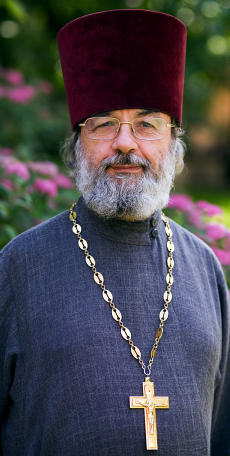 We have created an environment that simply encourages any deviation from the norm, all the while maintaining that everything is permitted, that human beings are free and should never be impeded, and so forth. We live in a distorted environment, one in which the unnatural manifestations of the human soul’s dark movements are encouraged and defended. While, on the contrary, those who try somehow to combat these abnormal manifestations are condemned.
We have created an environment that simply encourages any deviation from the norm, all the while maintaining that everything is permitted, that human beings are free and should never be impeded, and so forth. We live in a distorted environment, one in which the unnatural manifestations of the human soul’s dark movements are encouraged and defended. While, on the contrary, those who try somehow to combat these abnormal manifestations are condemned.
Modern science, basing itself on materialistic notions, considers it impossible to battle against such manifestations; and, since it is impossible, they are declared the norm. Indeed, if there is no hope in the all-powerful help of God, sin cannot be defeated – it surpasses human strength. However, if one trusts in God and has firm hope, then any sin, deviation, or distortion of human nature can be corrected and healed. One can then live happily and fully, not suffering from one’s sinfulness and the associated inferiority.
There are everyday sins: for example, quarreling but then making peace or being offended and then forgiving. But then there are also mortal sins that condemn the soul of the unrepentant sinner to eternal torment. These torments are so terrible that the Apostle Paul warns: Know ye not that the unrighteous shall not inherit the kingdom of God? Be not deceived: neither fornicators, nor idolaters, nor adulterers, nor effeminate, nor abusers of themselves with mankind, Nor thieves, nor covetous, nor drunkards, nor revilers, nor extortioners, shall inherit the kingdom of God (1 Corinthians 6:9-10).
No sin is the norm; each is a distortion of human nature. The Church regards sin precisely as an illness that can be healed by faith in God, repentance, and prayer. The Church’s millennia-old experience witnesses to this: And such were some of you: but ye are washed, but ye are sanctified, but ye are justified in the name of the Lord Jesus, and by the Spirit of our God (1 Corinthians 6:11).
Moral illnesses are similar to infectious diseases: they are contagious. But, unlike regular infections, they can be transmitted virtually. The vectors are the means of mass communication, including television and the Internet, which propagandize corruption as being the norm.
History is repeating itself: a promiscuity is reigning in our society similar to that of the pagan, corrupt Roman Empire during the preaching of the Apostles: Who changed the truth of God into a lie, and worshipped and served the creature more than the Creator, Who is blessed for ever. Amen. For this cause God gave them up unto vile affections: for even their women did change the natural use into that which is against nature: And likewise also the men, leaving the natural use of the woman, burned in their lust one toward another; men with men working that which is unseemly, and receiving in themselves that recompence of their error which was meet (Romans 1:25-27).
In order to conquer such sin (and the Church regards such manifestations as grave sins), one needs a very keen and living desire to change. But if neither parents nor child understands that homosexuality is unacceptable, it is unlikely to be overcome.
The best precautions against such deviations are moral purity, chastity, abstinence, and marital fidelity. Marriages are made in heaven; the family is created once and for all. This is the ideal towards which we strive.
The sinful person, just like the sick person, requires compassion first of all. He needs help and kind, comforting words, not rebuke or reproach. The person should be loved, but by no means should his sin be accepted. The sin must be treated without any compromise.
Therefore, in order to help someone get better, he should be placed in some kind of spiritual environment, where such sins are viewed as completely impossible, unacceptable, and unnatural; where any harmful contact, including the virtual, is excluded. The sinner is like the drug addict: to overcome chemical dependency, he needs to undergo withdrawal.
This, of course, is hard. In such battles, winning is difficult. In order to emerge victorious, the sincere desire to overcome sin is essential, as are patience, persistence, courage, and faith that nothing is impossible for the Lord.
And if the Lord is with us, who can be against us?
Priest Dmitri Sverdlov comments:
So far as I know, among those who practice homosexuality, there are not very many biological homosexuals. The vast majority of homosexuals are so-called social homosexuals: their orientation is a consequence both of their own internal problems and of social problems, such as their inability to communicate with their society, first and foremost with their own family.
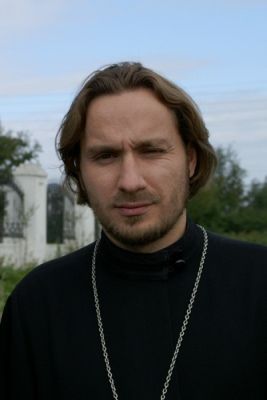 The sexual identity of such people is a form of protest, frequently against the family. Sometimes it is a form of protest against society and sometimes it is the result of their inability to find their place in society. In either case, it is caused not just by their own inner problems, but also by the problems of their community.
The sexual identity of such people is a form of protest, frequently against the family. Sometimes it is a form of protest against society and sometimes it is the result of their inability to find their place in society. In either case, it is caused not just by their own inner problems, but also by the problems of their community.
If it is indeed the case that acquired homosexual orientation is a reaction against society and the family, then individual, society, and family all share responsibility.
The Church’s position is unbending and perfectly straightforward. Homosexuality is a clear and evident sin. But if it is a sin, the sin of homosexuality is neither better nor worse than the sin of fornication, the sin of pride, or the sin of avarice. They all have harmful effects on the human person.
I once heard the Confession of a homosexual who understood the sinfulness of his orientation. This person was churched and felt repentant. Regardless of the fact that he had not practiced such relations for a period of time before this Confession, he understood that the inclination remained alive in him. This worried him very much.
I gained the impression that he had a perfectly appropriate, sober, intelligent, and repentant attitude towards his problem. This was a fairly long time ago, and I do not recall how our interaction ended – he was not a regular parishioner of ours. I do not remember whether I blessed him to receive Communion or even whether we spoke about it.
But it struck me that someone with this inclination, someone who recognizes and repents of his sin, is a full member of the Church. It is his repentance that makes him a member of the Church – in contrast to, say, someone haughty who does not see his own pride and therefore cannot repent of it.
Given that I do not know the author’s family, I can only speculate, but it is likely that the father’s conflictive and harsh position could have provoked the son’s choice, which took on this form of protest. In which case the responsibility would lie on the father as well, and not just on this particular young man.
Unfortunately, traditions of the conscientious upbringing of children and of pedagogy are entirely undeveloped in our society. In fact, it seems that the main thing is to have a child and then “put him on his feet”; but nearly no one gives their child a systematic upbringing. After all, such relational problems cannot be resolved simply by a passing conversation with a priest or by a short consultation with a psychologist.
Any sane priest would have reminded the parents about the law of love, of the necessity of showing their son love, regardless of what kind of son he was. After all, the basis of many childhood problems is that the parents feel an undivided right over their child, seeking to realize their own parental authority through despotic methods.
This is the sin of parental pride: “I gave birth to you, so everything will be my way.”
Such an approach lacks both love and humility. A child is not mine. A child is God’s. But these passions – parental pride and anger, which emerge when a child begins to express himself – become destructive for the child’s soul, the parents, and the relationship. In some cases it leads to monstrous protests by the child.
Archpriest Andrei Lorgus, psychologist, comments:
The first thing that needs to be stated is that the vast majority of literature on this subject in circulation contains the lie that homosexuality is an innate predisposition; that it is, so to speak, from “nature.” The basis of this lie comes from the decision in 1973 that lead to the exclusion of homosexuality as a personal pathology from the DSM ([Diagnostic and Statistical Manual of Mental Disorders] the classification of mental disorders published by the American Psychiatric Association).
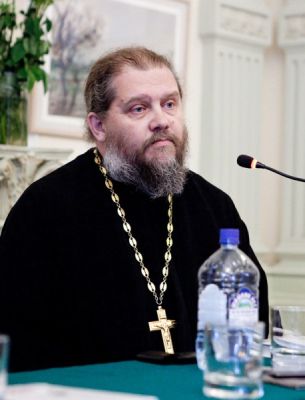 This decision was reinforced by some unreliable research, such as the sensational pronouncements of the neurophysiologist and gay activist Simon LeVay in 1991. Although these pronouncements even then had not been verified by competent research, they continue to receive general recognition, even though they have not been confirmed by numerous additional studies.
This decision was reinforced by some unreliable research, such as the sensational pronouncements of the neurophysiologist and gay activist Simon LeVay in 1991. Although these pronouncements even then had not been verified by competent research, they continue to receive general recognition, even though they have not been confirmed by numerous additional studies.
In fact, this is far from the truth. The choice of sexual partners, whether homosexual or heterosexual, is the result of psychosocial development and childhood and adolescent history.
Second, it should be understood that it is not a disease, but a distortion of personality. This is not a matter for physicians, because there is in fact no psychiatric component. Neither a narcologist, nor a neurologist, nor a psychiatrist can be of any help here, inasmuch as there are no clinical symptoms. It is a personality disorder with potential repercussions.
It is important to bear in mind that homosexuality can be expressed in various ways. Thus, there are people with homosexual inclinations whose problems do not interfere with their gender identity: that is, men recognize themselves as men and women as women. There are people with homosexual inclinations who do not practice them; that is, they do not translate their attraction into the realm of action and do not engage in sexual relations with people of their own gender.
Finally, there are homosexuals proper – of whom there are very few – who not only have homosexual inclinations, but also openly act on them. They make their choice and, in fact, thereby willfully determine their behavior.
Some live openly, preferring to act in accordance with their new sexual identity by their external appearance, clothing, and behavior; others do not exhibit this, outwardly remaining committed to their gender, acting on their homosexual inclinations only in direct sexual behavior.
It is very important to understand that the number of homosexuals who act out their choice is in fact very small. In society we see a homosexual awareness campaign that artificially inflates this literal minority. For example, percentage-wise there are many more people suffering from diabetes or experiencing bouts of claustrophobia in our society. But none of these “minorities” either engage in such active propaganda or attempt to impose its alien skills, traditions, and forms of behavior on society.
It is a sign of our times that, although homosexuality has existed for a very long time, it has never before been a central cultural and ethical problem. After all, the percentage of people who act on their homosexual inclinations does not at all correspond to the scale of the debate going on in society and, above all, in the mass media.
A book by two American psychologists of Greek origin, Joseph and Linda Nicolosi, entitled A Parent’s Guide to Preventing Homosexuality,was released a few years ago in Russia, in 2008. This book speaks in detail about homosexuality, especially to parents who face these problems or fear that they might arise in their family. I recommend this book. [1]
There is no doubt that everything happening with a child is interconnected with his family. Therefore the influence of the family is, of course, primary. Psychologists know the causes and conditions under which homosexuals grow up in families. A particular combination of the parents’ behavior and character can create the conditions for the development of homosexual behavior in a child. But these are only conditions.
It is very important to understand that, even if these conditions are actually met in a particular way within the family, this does not mean that the child is sure to experience homosexual inclinations.
Of course, in practice one encounters extremely distorted parental behavior. For example: parents want a boy, but a girl is born. They buy boys’ clothing for the little girl, cut her hair like a boy’s, and the father takes her to the garage to teach her how to use a wrench and hammer. In short, the parents very much wanted a boy and were annoyed when a girl was born. So they make a boy out of this little girl.
The opposite also happens: a single woman wants children no matter what and somehow manages to conceive and give birth to a boy, whom she then turns into her girlfriend. Quite literally: she raises him from a young age as her girlfriend. Thus the son chooses a manner of interaction with his mother that makes it convenient for him to develop as a girl.
Children, out of loyalty, are capable of various great feats and miracles. There is no biological, hormonal, or natural predisposition for homosexuality and locating one is impossible. But I must once again emphasize that, whatever conditions arise in a family, a child can nonetheless grow up quite different. It is important to understand that there should be no sense of impending doom here.
This is all the more so, given that gender identity is completed in early adolescence, during which everything is very plastic – that is, changeable – and various possibilities for development exist for the adolescent: either along a homosexual or a heterosexual path.
Therefore, the adolescent ultimately exercises this choice himself. The adolescent completes the final stage of self-identity independently; moreover, the influence of the parents by this point is minimal.
Unfortunately, homosexual boys often relate that in early childhood an adult or older child had seduced them. Unfortunately, this happens quite often: namely adults or older children committing sexual abuse. This can takes place in a closed educational institution or in a sporting organization.
Outside of Russia, this means schools and colleges where groups of boys and girls live separately, closed off and isolated, where they “stew in their own juices.” It is here that the initial sexual abuse often takes place, which later prompts them to seek out further such relations.
What should parents do? Once they have found out and have read the whole book, they could turn to a specialized psychologist to overcome their shock and to receive some instruction about how to conduct themselves.
That is one direction. The other direction is to ask for help from the Church. It goes without saying that the Church can do much for parents, abused children, and children who have such inclinations. But there is a difficulty here: adolescents generally shy away from Confession precisely because they are experiencing sexual problems that they do not want to discuss with priests, feeling ashamed and being afraid they will be judged.
This is a very difficult period. Educators specializing in adolescence are of course needed during this period as are, it goes without saying, priests who have been specially trained. Not every priest is capable of this.
I have already recommended the book by Joseph and Linda Nicolosi. What else can parents do? Can a child return to his natural orientation? Yes, he can. But – and this is very important to understand – it can only be done on the basis of his own desire and his own decision. There is no other way. To change someone’s sexual orientation from without is impossible.
This is a question of the inner life and only the inner life. No external means of intruding into the inner world can change anything. So, for example, certain parents pay for prostitutes for their homosexual sons, hoping this might change them. But, first, this is a grave sin; second, this is sexual abuse of the child; and, third, this solves nothing. Unfortunately, parents make such mistakes.
In general, any form of violence is a gross error. Use of force, reasoning with them, scaring them, sending them to a monastery – none of this works.
Translator’s note:
[1] The original English edition was published by InterVarsity Press in 2002.
Translated from the Russian.












